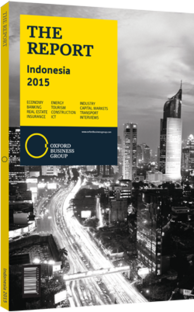Ensuring intellectual property protection and quality assurance in Indonesia's pharmaceuticals sector
The introduction of universal health care is expected to have a major impact on Indonesia’s already thriving pharmaceuticals sector. Analysts have predicted that 2015 will be a watershed year for pharmaceuticals, with the full implementation of universal health care (known as JKN locally) expected to increase demand for prescription medications. Generics especially will benefit, because the government relies on them to keep costs under control. JKN is again the driver of this trend, as it covers the cost of prescription drugs in its formulary, the majority – 92% – of which are generics.
Drug spend as a percentage of total health expenditure will be close to 19% after the full implementation of the JKN programme, Frost & Sullivan’s Reenita Das told industry site PharmExec.com. Overall, the country’s pharmaceuticals market is expected to expand twofold to $9.5bn per year by 2018, according to IMS Health data, reaching $9.9bn by 2020 and growing at a compounded annual growth rate of 10.2%.
In 2014 over-the-counter (OTC) purchases totalled 40% of the entire pharmaceuticals market, and analysts expect that expenditure to expand to about half by the end of 2015. Local drug manufacturers dominate the OTC market. These firms, such as Tempo Scan Pacific, the Darya-Varia Group and Konimex, together control about 75% of the total OTC market.
FDI
The nation’s chemicals and pharmaceuticals industries garnered $2.3bn in foreign direct investment in 2014, according to the Indonesia Investment Coordinating Board. In 2014 the government increased the amount of foreign investment allowed in Indonesian pharmaceutical companies (those involved in the manufacture of drugs, raw pharmaceutical materials and finished drugs) from a 75% stake to 85%. However, no changes were made to the requirement for foreign firms to have an Indonesian partner, an ongoing issue for some international pharmaceutical companies concerned about protecting their intellectual property (IP).
Despite this requirement, several multinational pharmaceutical companies have Indonesian operations. Merck, Bayer, Novartis and Pfizer all operate facilities in the country, and a raft of mergers and acquisitions (M&As) has begun in anticipation of the surge in demand for pharmaceutical products.
M&A
A sampling includes a February 2014 deal, projected to be worth $200m, in which German firm Fresenius Kabi AG bought a 51% stake in Indonesian drug maker PT Ethica Industri Farmasi, which manufactures generics, and a March 2014 deal that saw GlaxoSmithKline pay $40m for the outstanding 30% share in its consumer health unit held by Sarasvati Venture Capital. The unit confirmed sales of almost $84m in 2013. One of the most notable of these mergers is the government’s plan to combine two state-owned generic drug manufacturers, PT Kimia Farma and PT Indofarma.
IP & QA
Yet foreign investors wary of losing control of their IP point to insufficient inspections and enforcement, as well as Customs systems shortcomings, which present obstacles to entering the Indonesian market.
“Non-efficient and non-transparent IP protection for pharmaceutical products and medical devices leaves major loopholes in Indonesia’s health care system,” Joshua Owide, an industry analyst at GlobalData, told Business Standard in April 2014.
The local pharmaceuticals industry will also need to address quality factors and sourcing issues as it expands and matures. The country imports most of the source materials used in the manufacture of pharmaceuticals, and the regulatory system is inadequate to ensure quality controls on all imported compounds. The dangers inherent in this situation became apparent in February 2015, when the mispackaging of an anaesthetic manufactured by Kalbe Pharma, the country’s largest pharmaceutical company, resulted in the deaths of two patients at a Jakarta-area hospital.
If the sector can overcome the issues related to government reliance on generics and simmering IP and quality assurance issues, it will avoid any unpleasant side effects that might risk putting the brakes on the growth of the pharmaceutical industry in the longer term.
You have reached the limit of premium articles you can view for free.
Choose from the options below to purchase print or digital editions of our Reports. You can also purchase a website subscription giving you unlimited access to all of our Reports online for 12 months.
If you have already purchased this Report or have a website subscription, please login to continue.

